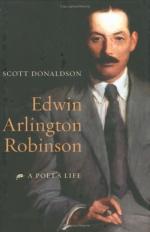|
This section contains 6,637 words (approx. 23 pages at 300 words per page) |

|
SOURCE: “The Young Robinson as Critic and Self-Critic,” in Edwin Arlington Robinson Centenary Essays, edited by Elsworth Barnard, University of Georgia Press, 1969, pp. 68-87.
In the following essay, Anderson discusses Robinson's theory of poetry as revealed in his comments on his own works and those of his associates.
“I don't know anything about the poetry of the future,” E. A. Robinson once said, “except that it must have, in order to be poetry, the same eternal and unchangeable quality of magic that it has always had. Of course, it must always be colored by the age and the individual, but the thing itself will always remain unmistakable and indefinable.”1
In a like vein but somewhat earlier, Robinson had written to a friend, “… he [Goldwin Smith] thinks Tennyson is great because he can call ‘hydraulics, astronomy, steam railways, balloons, etc.’ by poetical names. … Nothing in the world tickles me...
|
This section contains 6,637 words (approx. 23 pages at 300 words per page) |

|


